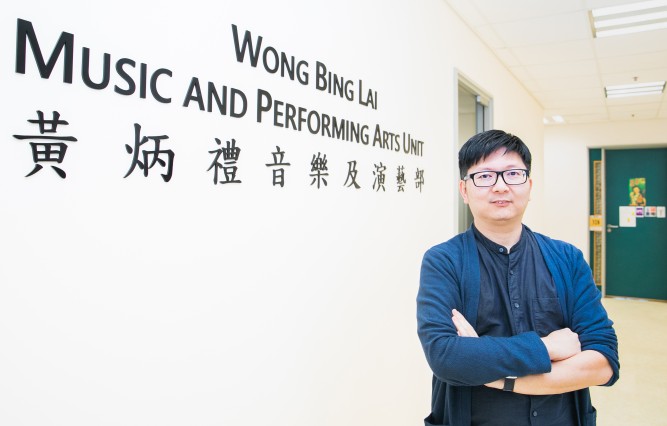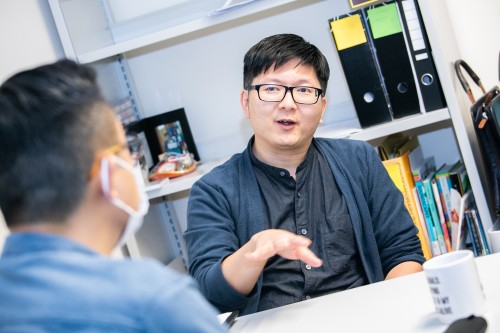Cross-boundary music education embracing the arts, well-being and sustainability that helps all-rounded development of students

To strengthen Lingnan’s whole-person education and enhance the breadth and depth in teaching and learning of undergraduate courses, the University merged the Wong Bing Lai Music and Performing Arts Unit (WBLMP) with the Core Curriculum and General Education Office last year to add new elements to the existing music courses and activities.
"Our courses and activities are not designed to train music players or performers. Instead, we strive to inspire students from different backgrounds and disciplines - even if they don’t have any musical background - to understand and experience the benefits of music beyond its aesthetic function. Instead music helps to offer them a holistic self-development education.” says Prof Ip Kim-ho, Head of WBLMP (Pictured).
He added that apart from courses which foster students' creativity, WBLMP will focus on subjects related to both physical and mental health, as well as sustainability, and has plans to introduce a Minor in Music and Cultural Sustainability programme. "For example the course named Creative Expression with Music does not only motivate students to use creativity to solve problems, it also enables them to communicate with others and express their feelings. This is an example of how we combine music, creativity and well-being.”
As an indispensable part of culture, music is closely related to the sustainable development of a country or region. "Music is directly related to our cultural heritage. For example, Hong Kong people mainly learn about Western classical music, but how does it reflect the significance in our culture? Our courses will also explore how the Hakkas and Wai Tau clans brought the Lingnan culture to Hong Kong, and their influences today.
“With changes in our society, students need to understand the history and cultural context beyond their own generations of Hong Kong people,” Prof Ip said, “and such inter-generational knowledge and cultural sustainability is an important element of Lingnan's liberal arts education.”
Different from ordinary classroom settings, WBLMP arranges for students to play musical instruments through experiential learning. "We hope that students can be exposed to music, and learn to realise the relationship between music and culture. Some people may call this music appreciation, but we regard it as a kind of musical literacy. Just as learning a language requires reading and writing, when students listen to more music, they gain the musical knowledge to understand what the composers and performers are doing. This increases the sustainability of musical heritages and teaches more people about the diverse functions of music.”
Apart from courses, WBLMP also organises activities such as lectures and concerts to broaden students' horizons and strengthen their understanding of different communities. For example, in "Finding Self: the story between a spiritual teacher and his music" this month, WBLMP invited Venerable You Zhe from the Tsz Shan Monastery to talk about his lifetime of combining music and Buddhism. "This is not just to advocate Buddhism or meditation, but to show students that many things in the world are not absolute. Such as Buddhism is not necessarily without music, and Buddhist music can even be integrated with heavy metal. I hope students learn about the importance of life from this. One can always try different things, and understand that life is never without choices."
According to Prof Ip, who joined LU in 2017, Lingnan students are very modest, enthusiastic about learning, and willing to accept their instructors’ teaching. "Many people think that students coming to Lingnan lack self-confidence and feel that they are not the elites, but this is exactly what drives them to learn eagerly. They all have creativity and potential," Prof Ip said, and told a story about a BBA student who took the bus between Lingnan University and Sheung Shui every day. The student found that the passengers did not talk to each other, so he thought of setting up a radio station for them to listen to music during the journey. "Although it was just an assignment, it shows the students are good at observing daily life and being creative," Prof Ip explained.
"Regardless of their majors, and what professions they follow eventually, the music they learn here can be useful for a life-time. Whenever our team designs courses and activities, we consider what benefits they can bring to their career and life development, and our contributions to that,” he said.

Prof Ip says apart from courses which foster students' creativity, WBLMP will focus on subjects related to both physical and mental health, as well as sustainability, and has plans to introduce a Minor in Music and Cultural Sustainability programme.

